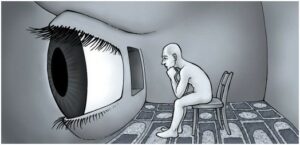Contents
- 1 What Is Depersonalization?
- 2 Signs Of Depersonalization
- 3 Causes of Depersonalization
- 4 How To Stop Depersonalization?
- 4.1 1. Reach Out To Someone For Help
- 4.2 2. Change Your Negative Thought Patterns
- 4.3 3. Stay Busy
- 4.4 4. Keep Yourself Healthy
- 4.5 5. Acknowledge Your Feelings
- 4.6 6. Remind Yourself That Nothing Is Wrong With You
- 4.7 7. Try Not To Focus On Your Physical Symptoms
- 4.8 8. Take Deep breaths
- 4.9 9. Try Not To Think About Future
- 4.10 10. Get Some Sunlight
- 4.11 11. Talk About Your Feelings
- 4.12 12. Avoid Drugs And Alcohol
- 4.13 13. Get Out Of Your Comfort Zone
- 4.14 14. Don’t Push Your Feelings Aside
- 4.15 15. Talk To A Healthcare Professional
- 4.16 16. Remind Yourself That This Won’t Last Forever
- 4.17 17. Keep A Journal
- 4.18 18. Meditate Daily
- 5 Treatment Options for Depersonalization
- 6 Stop Depersonalization From Happening Again
- 7 Conclusion
What Is Depersonalization?

Depersonalization is a disorder that causes individuals to feel disconnected from their bodies and the world around them. They may feel like they are watching themselves from afar, or that they are in a dream-like state. People who experience depersonalization often feel like they are living in a fog and have lost their sense of self. Below are some ways to stop depersonalization.
Depersonalization is a dissociative symptom and it can be brought on by stress or anxiety, however, it is usually triggered by an extremely traumatic event. Depersonalization does not make you feel like you are in a 9-5 job doing errands for your boss all day. However, feeling out of place and submerged in everything around you is what depersonalization sufferers often feel.
Signs Of Depersonalization

If you are experiencing any of the following symptoms, you may be suffering from depersonalization:
- Feeling disconnected from your body
- Feeling like you are living in a fog or dream-like state
- Loss of sense of self
- Feeling like you are watching yourself from afar
- Feeling like you are living in a fog, daze, or hazy state
- Distorted view of yourself and your body
- Frequently feeling that things aren’t real
- Frequent thoughts about existentialism and the meaning of life
Causes of Depersonalization
Depersonalization and derealization are often caused by significant emotional or physical trauma, such as the death of a loved one, illness, divorce, war, violence, natural disasters like earthquakes and floods. Sometimes these symptoms may be triggered by drug use.
Medications can also contribute to depersonalization and derealization disorders. Antidepressants, in particular selective serotonin reuptake inhibitors (SSRIs), are linked to these disorders. In fact, depersonalization and derealization symptoms have been reported by some patients taking antidepressants as a side effect of the medication.
How To Stop Depersonalization?

If you are feeling disconnected from the world around you. Then it might be time to make some lifestyle changes in an attempt to treat your depersonalization symptoms. For this, try getting more exercise and eating a healthy diet. This can increase serotonin levels in your system, which is closely linked to feelings of happiness. Meditation has also been proven effective in fighting depression and anxiety, both of which contribute to symptoms of depersonalization. If you feel like your symptoms are due to the medication that you are taking, then talk with your doctor about alternative treatments for depression or anxiety.
Many people experience mild symptoms of depressive disorder at certain points in their life, but there are ways to fight these symptoms so they don’t become overwhelming. If you cannot seem to get it.
There are a number of ways that you can stop depersonalization.
1. Reach Out To Someone For Help
This could be a therapist, friend, family member, or even your GP. Speaking about your symptoms can help you feel less alone and isolated. Remember that this is not your fault, and there are many people who understand how you feel.
When you’re anxious and depersonalization symptoms appear, it’s easy to want to isolate. However, chatting with a trusted friend or family member at such times may be beneficial. Being open makes you feel vulnerable. However, communicating allows you to get help from someone who cares about you. If you’re not sure who to turn to, consider calling a friend.
2. Change Your Negative Thought Patterns

Changing the way that you think about yourself can help to stop depersonalization. If you find yourself frequently thinking negative thoughts about yourself, try to remind yourself that this is not true and that people who care about you don’t think like that.
Depersonalization, for some people, simply entails a lack of intrusive ideas. Intrusive thoughts may be difficult for those who live with depersonalization and anxiety or PTSD. Cognitive psychologists recommend utilizing the technique known as psychological distance to quite disturbing ideas. Finding a gap between distressing ideas and unpleasant feelings is what psychological distancing means.
3. Stay Busy
When we become too focused on ourselves, we can start to feel disconnected from the world around us. To prevent depersonalization, try to focus on your daily activities and tasks rather than dwelling on your thoughts and feelings.
4. Keep Yourself Healthy
Working out and eating a healthy diet can make you feel better about yourself and reduce the risk of developing future mental health issues like depression and anxiety.
5. Acknowledge Your Feelings
If you find yourself experiencing these symptoms, try to be open and accept that these feelings are occurring. It can be difficult to acknowledge how you’re feeling, but doing so will help you to move past this phase.
6. Remind Yourself That Nothing Is Wrong With You
Depersonalization is often triggered by the fear of being judged negatively by others. This can lead to a negative view of yourself. Remember that everyone feels this way sometimes and you shouldn’t be afraid to reach out for help if you need it.
7. Try Not To Focus On Your Physical Symptoms

If you find yourself losing touch with reality and feeling disconnected from your body, try not to focus on these feelings. Remember that this is only temporary and will pass if you try to relax. This can be difficult, but it’s important to remind yourself that these feelings are not permanent. It might also help to make sure your environment around you is familiar, which could decrease the likelihood of another episode of depersonalization occurring.
8. Take Deep breaths
If you feel like your sense of reality is slipping away, focusing on something simple like your breathing could help you to get through it. Concentrating on deep breaths will help you to become more in tune with yourself and the world around you.
9. Try Not To Think About Future
When sufferers are trying to stop depersonalization, they often start worrying excessively about what will happen in the future. Remember that your feelings don’t define who you are and that nobody is defined by their emotions or moods.
10. Get Some Sunlight
Staying in the dark might make you feel like your world is closing in on you, but spending time outside can help to improve your mood. Therefore, getting some sunlight will make you feel more energized and connected with reality.
11. Talk About Your Feelings
At first, it can be difficult to open up about how you’re feeling because of the fear of being made fun of or judged. Remember that the people who care about you don’t see you as a label, and they will understand if you’re open with them.
12. Avoid Drugs And Alcohol
Drugs and alcohol can cause mental health problems like depersonalization. They can also make these symptoms worse, so it’s important to stay away from them if you want to prevent another episode of depersonalization.
13. Get Out Of Your Comfort Zone
Staying in the same routine and avoiding change can trigger future episodes of depersonalization. This is because we need a certain level of stress and anxiety to prevent us from growing too relaxed about our lives. Try to challenge yourself on a daily basis so that you feel more connected with others and the real world.
14. Don’t Push Your Feelings Aside
If you find yourself feeling distanced from the world around you, don’t bottle your feelings up because they will only worsen. Even if it can be difficult to identify what you’re feeling, expressing yourself could make a huge difference in helping you to overcome these symptoms for good.
15. Talk To A Healthcare Professional
If you feel as though these feelings are impacting your day-to-day life, you should contact a healthcare professional. They can help you to understand what’s going on and how you can reduce the risk of future episodes from occurring.
16. Remind Yourself That This Won’t Last Forever
You will eventually feel yourself coming back to reality if you allow yourself to take some deep breaths and relax. Reminding yourself that this isn’t permanent will help you stay strong amid the challenge, and it will also remind you that this feeling is only temporary.
17. Keep A Journal

Writing in a journal can help you track your feelings and stay focused on the present moment, rather than slipping into the past or future. Writing about how you feel at that moment can help to ground yourself emotionally, as well as alerting others who may read it later of what you’re going through so they can provide support.
18. Meditate Daily
Meditation is a great way to stay grounded and prevent further episodes of depersonalization. Meditation slows down brain activity and allows us to break free from our thoughts and worries for a few moments a day. Experts recommend meditating twice daily for 15 minutes each time, ideally morning and night before bedtime.
Treatment Options for Depersonalization
There are an array of effective treatment options for depersonalization. Different therapies are appropriate depending on the symptoms being experienced and the severity of symptoms.
Therapy
A therapist can help you explore your symptoms, what triggers them, and how to cope with them. The type of therapy that will be most helpful depends on your specific symptoms, how long you’ve been experiencing the symptoms, and if they’re caused by something more serious like schizophrenia.
Hypnosis
Hypnosis can be an effective treatment for anxiety disorders like depersonalization disorder, especially when the disorder is triggered by a traumatic event. As while using hypnosis, you can explore your past experiences to gain insight into what caused your symptoms.
Medications
Certain medications are used to treat severe cases of depersonalization disorder that don’t respond well to therapy or hypnosis alone. These pharmaceutical treatments include anti-anxiety medication, antidepressants, anti-psychotics, mood stabilizers, and benzodiazepines.
Stop Depersonalization From Happening Again

Depersonalization is a disorder that can reappear. Therefore these are some tips to help you stop depersonalization from reappearing.
1. Continue to seek help from a therapist if you are finding that the symptoms of depersonalization are interfering with your day-to-day life. If you aren’t currently seeing a therapist, find one who specializes in treating anxiety disorders like depersonalization disorder.
2. Educate yourself about what triggers your symptoms of depersonalization. For example, if you have been diagnosed with PTSD, you should avoid anything that may trigger a negative memory from your past trauma or cause an anxiety attack.
3. Maintain healthy lifestyle habits by eating nutritious food, exercising regularly, getting enough sleep, and indulging in a stress-relieving activity like yoga.
4. Ground yourself in the present moment by focusing on what you see, hear, smell, and touch right now. Take 5 deep breaths and make a conscious effort to feel your body as you breathe.
5. Remember that depersonalization is a part of your anxiety disorder and will likely go away if treated properly through therapy and medication.
6. Remind yourself that what you are experiencing is not real, but a symptom of anxiety that will go away if treated properly with therapy and medication.
7. If you begin to feel symptoms coming on, then immediately distract yourself by turning your attention elsewhere. Because engaging in an activity that requires concentration is one way to do this.
8. Avoid triggers that cause depersonalization, like certain medications or recreational drugs.
9. Practice mindfulness meditation to help train your brain to be more aware of what’s going on around you and in the present moment. This is a healthy coping mechanism for anxiety disorders in general, but can also be especially helpful for those with depersonalization disorder.
10. Don’t hesitate to use some of the treatment options for depersonalization if you feel like they will help manage your symptoms more effectively, such as hypnosis or medications. Everyone’s body is different so some people may find that these methods are more effective than simply therapy alone.
Conclusion
Depersonalization is a common symptom of anxiety disorders, but it doesn’t always have to interfere with your day-to-day life. However, if you are feeling symptoms coming on, take deep breaths and focus on the present moment by seeing what’s around you right now or counting backward from 100 in multiples of 3. You can also distract yourself by turning your attention elsewhere if necessary. Avoid triggers that cause depersonalization like certain medications or recreational drugs as well. If these methods don’t work for you, try one of the treatment options mentioned above such as hypnosis or medication to stop depersonalization. So for its treatment, reach out to our team and get the best treatment with care.
If you are looking for affordable Online Counseling MantraCare can help: Book a trial therapy session


